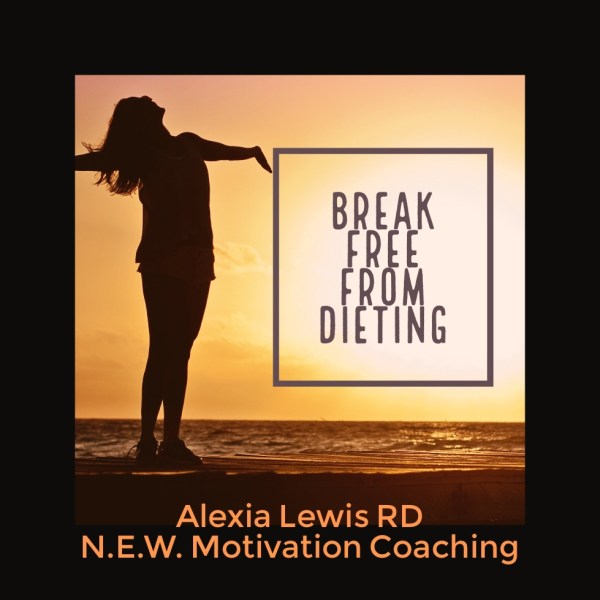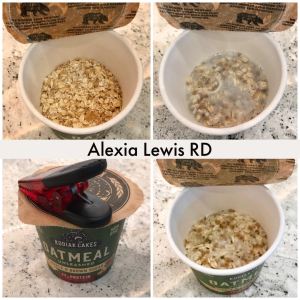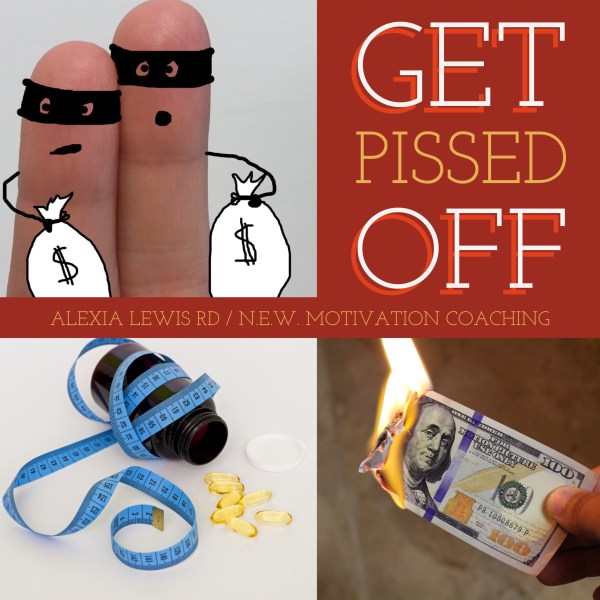Now that you are exploring the idea that diets don’t work, are you wondering what that leaves you with if you still want to improve your health and lose weight? It is a scary place to be. Many dieters have been dieting for a very long time and not having the structure and those good/bad thoughts about food and eating habits can result in feeling very lost and uncertain. We certainly are not comfortable trusting our bodies since we are not happy with how our bodies look. We certainly cannot trust our bodies because our bodies are always hungry (um, yeah, because we are starving our bodies on diets!).
Life with no diet plan? No food rules? How will we know what to eat? How will we keep from eating way too much food or binge-eating? We will dive in to the deep end with food and just get bigger!
So many times when I start working with a new client, I hear a very familiar story. It goes something like this:
What I ate yesterday? Oh, well, that was a bad day [laughs] but okay. I got up and I had a cup of coffee with a splash unsweetened coconut milk and honey – I know sugar is bad but honey is natural – and I ate 1 packet of instant oatmeal made with water. I was hungry mid-morning but I was good and didn’t eat until lunch time! For lunch, I had a salad and a diet soda. What was on the salad? Oh, it was just lettuce and tomatoes with one of those tuna packs. No, no dressing or croutons – I can’t eat those! By 4:00 I was so hungry but I drank a lot of water to fill up my stomach and I managed to make it home without eating! For dinner, we had grilled chicken and I had a few broccoli florets. My husband had some rice but I know carbs make me fat so I skipped that. To drink, I had a couple glasses of red wine – I’ve heard that’s good for my heart, right? I was so good yesterday and was so proud of myself but then, I was so bad. I just could not stop eating after dinner. I know I’m not supposed to eat after 6pm… are you sure you want to hear this? Okay, well, first I had some crackers with cheese… and then I had a lo-calorie popsicle… and then I had a big bowl of chopped pineapple… and I was still hungry and well, I knew I blew it at that point and was being bad so I went ahead and ate one of those big microwave bags of popcorn and before bed I had some ice cream! So far today though, I’m being good again and eating right.
It is a way-too-familiar story because it is the pattern of most of the people I talk to who are trying to diet. If you read that again and look for food rules and good/bad language, it will jump out at you. If you total up those calories (sorry, dietitian-brain took over) – or think about how much food was eaten before the after-dinner snacking began – you know it is not enough to fuel a body! Of course you are hungry. You are starving your body. Yes, I know it’s on purpose because you want to lose weight but it backfires every single time, doesn’t it?
And no, it’s not because you aren’t good enough; aren’t strong enough; didn’t try hard enough. It’s because: physiology. Undereat… undereat…. Ignore hunger… undereat… binge! See you again tomorrow diet!
But without a diet plan, we now are staring into a void. Without the rules, what is left?

There is a new buzzword out there: anti-diet (or reverse dieting). It has been around for a while but maybe you just haven’t seen it before. Other names you may have heard are no-diet, non-diet, mindful eating, intuitive eating, and some others. It is about listening to your body – and yes, you can trust your body – once it has learned it can trust you not to starve it again… although that may take a little time. Your body has learned that starvation is always coming if you are a repeat dieter. But with time, you can get past that point and get back in sync with your body.
What does a non-diet approach look like? It may be different for different people but here are some ideas – and I’m sure you could add your own ideas to this list once you get the hang of it:
- Eating foods you like in amounts you desire, which means
- Eating when you are hungry instead of ignoring your body when it is crying out for fuel and energy
- Stop eating when you are satisfied from a meal. Yes, this takes practice and it is hard work; but doesn’t that make more sense than eating a set number of calories or points or only green foods?
- Consider what you want for your health and choose foods that move you in that direction
- For example, if you are working on lowering cholesterol then eat more foods with fiber and unsaturated fats
- Focus on quality nutrition by swapping out nutrition-poor foods for more nutrition-rich foods
- Allow yourself to eat what you really crave and enjoy – have those treats and other foods you love and told yourself you would never eat again
- Following that, only eat foods that you enjoy. I do have one pretty big food rule that I recommend we all follow: Never eat something you don’t like. Seems elementary but a lot of people choke down “healthy” foods and drinks that they hate
- Find activity that you truly enjoy regardless of the intensity or “calorie burn” and then do it consistently (and joyfully!)
Answer a question for me: Are these positive guidelines or negative ones?
The diet industry has made people hate themselves into desiring to change by following rigid and ridiculous rules. This approach is all about loving ourselves into change with flexible and enjoyable guidelines!
Think about it. The diet culture banks on you hating your body. You hate your body and so you diet and exercise because your body is wrong, it can’t be trusted, it’s signals must be ignored, and you are not worthy. You must eat a certain way (diet), obsess about food, power through the physical and emotional pain of hunger, and don’t forget to exercise to as a penance for eating. And maybe one day, after you suffer the consequences of “getting yourself back” after having “let yourself go,” you finally can be deserving of love and worthy and valuable.
The no-diet approach is based on loving yourself and realizing that your body is worthy and beautiful, you can trust it and listen to its signals, and if it never changes, you are enough, you are valuable, and you are worthy. You eat because food is nourishing – and delicious – and you get to exercise and move your body in ways that feel good. These things are rewards, not punishments!
And listen, you can still seek to improve your health. There is nothing wrong with that. Do you think those who strive to be millionaires shrug their shoulders and stop trying because the majority of people don’t make it? Heck no. If that were the case, then millionaires would only be born, not self-made. Self-made millionaires seek to improve on their weaknesses and put in the hard work. They read, meditate, get up earlier, work harder, and improve themselves. Do you think they hate themselves until they make their first million? Heck no! (So why do you hate your body until you lose weight?). They believe in themselves, they love themselves, and they know they are worthy of achieving their dreams.
Breaking the diet mindset is not easy work.
A funny thing happens with weight when many people stop dieting… not right away; but over time, people’s weights settle at the weight that is best for their bodies. You may lose weight if your body has a lot of weight on it because you are treating yourself poorly with food and not being active and then you start treating yourself better by eating nutrition-rich food and getting more active; but weight is not the focus. You may gain weight if you’ve been dieting forever and now you break all your “diet rules;” but the research doesn’t indicate that weight is gained with a non-diet approach and weight is not the focus. If you lose weight, great! If you don’t lose weight, great! If your weight doesn’t change, great! Once you can embrace that, you will have flipped off diet culture and be on your way to living a happier, healthier life!
Do you want to learn more? Please join our upcoming Redefining Healthy Book Club: Readings to Break the Diet Cycle and Live the Good Life. We will meet virtually and in-person if you are in the Ponte Vedra, Jacksonville, St. Augustine area of Florida.
Yours in Good Health,
-Alexia Lewis RD
This article is Part 4 of 4 in “Health versus Weight as a Focus for Wellness” which will be published during the month of June 2017.
Part 1: The Continuum of Approaches to Health: Thoughts from a Curvy & Healthy Dietitian Health Coach
Part 2: Who is the Best Health Professional to Help with Creating New Lifestyle Habits?
Part 3: If Diets Don’t Work, How Can a Health Coach Help Me?
References & Resources
T.L.Tylka, R.A. Annunziato, D. Burgard, et al, “The weight-inclusive versus weight-normative approach to health: Evaluating the evidence for prioritizing well-being over weight loss,” Journal of Obesity, vol 2014, article ID 983495, 2014. View at: https://www.hindawi.com/journals/jobe/2014/983495/.
A. Bombak, “Obesity, Health at Every Size, and Public Health Policy,” American Journal of Public Health, vol. 104, no.2, pp. e60-e67, 2014. View at: https://www.ncbi.nlm.nih.gov/pmc/articles/PMC3935663/
Like this page? SHARE it with your friends!


























You must be logged in to post a comment.